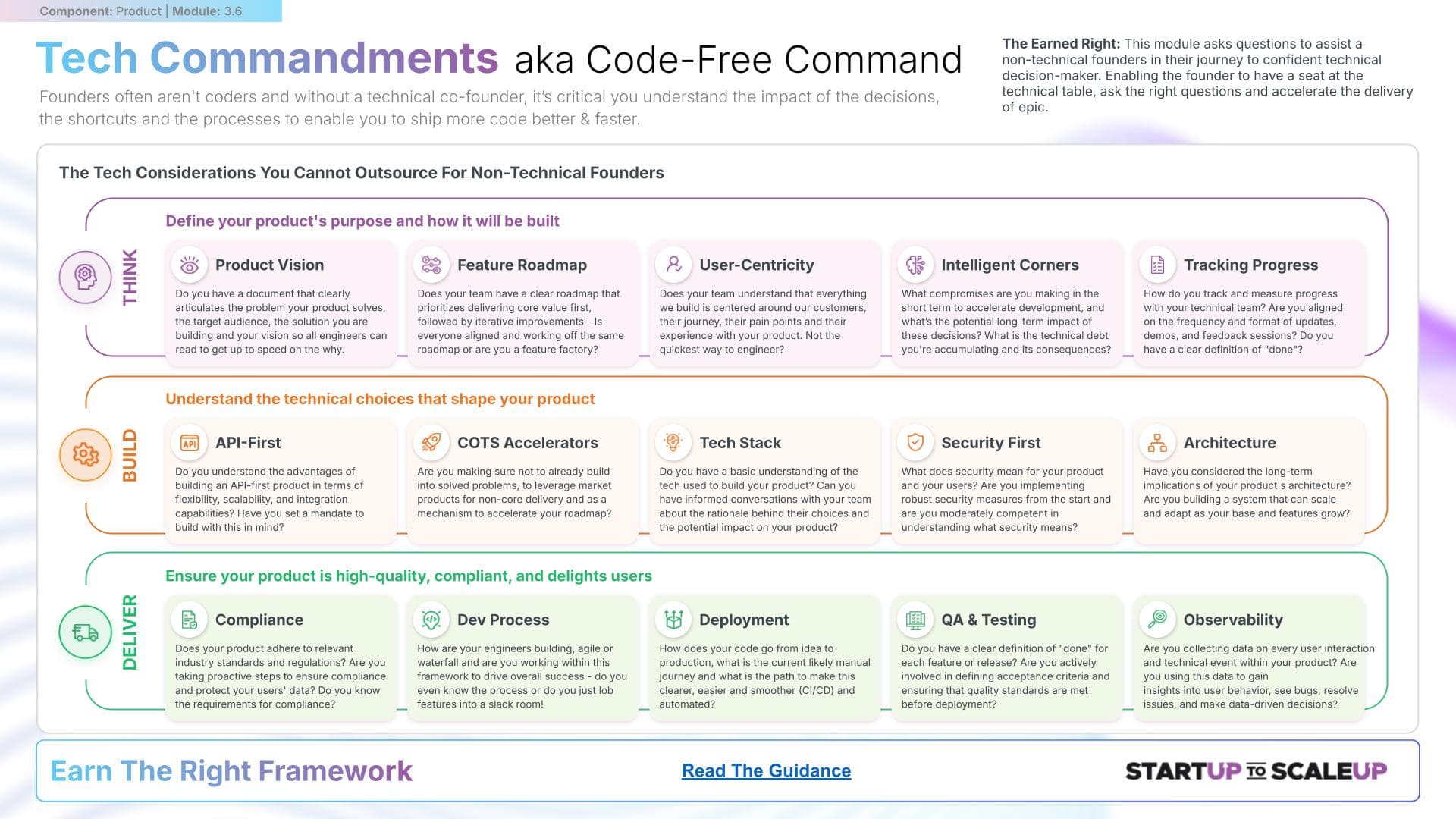Related Framework

Tech Commandments
Subscribe to the Newsletter
Join 140,000+ founders getting exclusive strategies, frameworks, and founder stories every Sunday.
Get instant access to the 50-Step Founder Playbook downloaded over 1M times
The Non-Technical Founder's Guide to Technical Leadership
There has never been a better time to be a non-technical founder, but that comes with a responsibility to understand what's happening under the hood in your startup's tech stack.
Core Takeaway
TLDR
- Even as a non-technical founder, you must understand what's happening in your tech stack - it's the engine that powers your entire business and dictates your speed, flexibility, and scalability.
- Blindly delegating technical decisions doesn't make you non-technical; it makes you negligent. You need to be able to ask the right questions and understand the tradeoffs being made.
- Every startup will cut corners - the magic is knowing which corners are intelligent shortcuts and which will forever haunt you. Your goal should be to release better code quicker.
Hey Reader,
There has never been a better time to be a non-technical lone wolf founder; with an abundance of tools to assist you on what you don't know. (𝕏)
With that... comes the responsibility to understand what's happening in the engine room. Blindly delegating tech decisions doesn't make you non-technical; it makes you negligent. (𝕏)
TL;DR Having a seat at the technical table, asking questions, and understanding decisions directly impacts your ability to deliver epic. (Workbook)
LAST WEEKS FRAMEWORK:
LETS GET INTO IT:
Your goal? Leverage these tools and be dangerous enough to take a position. Your tech stack isn't just code; it's literally the engine that powers your entire business. It dictates your speed, flexibility, and scalability. Feels like an awful idea to be at the mercy of someone else's decisions.
You're in the delivery business. Clock speed - how quickly you can build, learn, iterate, release, again, and again - this is defined by your foundational technical decisions.
A poorly built solution will still get you there, but will limit this speed, flexibility, and your ability to mature and technically keep up with the market.
It doesn't seem unreasonable, that you should be able to:
- Ask the right questions and challenge your tech team.
- Understand the trade-offs being made in technical decisions
- Know how your solution might scale and the impact of tech debt.
- Fight for ways to accelerate your delivery to production.
Skill up urgently. Speak tech, even if you don't write it.
Tech Commandments For Non-Technical Founders
One more thing...
Every startup will cut corners, the magic is which corners are intelligent, and which will forever haunt you. It's fine... as long as you know and have a voice in these decisions.
Out of all of this, you have two goals.
- Everything you can do to release better code quicker.
- Delay hearing "We didn't build it that way" when you request a feature.
A good place to start:
- Understand your product architecture: Know how your system is structured and why.
- Leverage existing solutions: Don't reinvent the wheel; use COTS where a non-core problem has already been solved.
- Plan for growth: At least design with scalability in mind, even if you don't implement it all upfront.
- Prioritize security: Make it a cornerstone of your product from day one.
Your startup is built on a foundation of ones and zeros. Respect that.
Off topic. I'm thinking of converting all these modules into a cohesive live course, from idea origination to first customers, literally pebble by pebble. Would this be helpful?
As always, if I can be of service, feel free to grab time with me.
-- James
More Newsletters
Continue Your Founder Journey
Explore all the resources available to help you build and scale your startup



